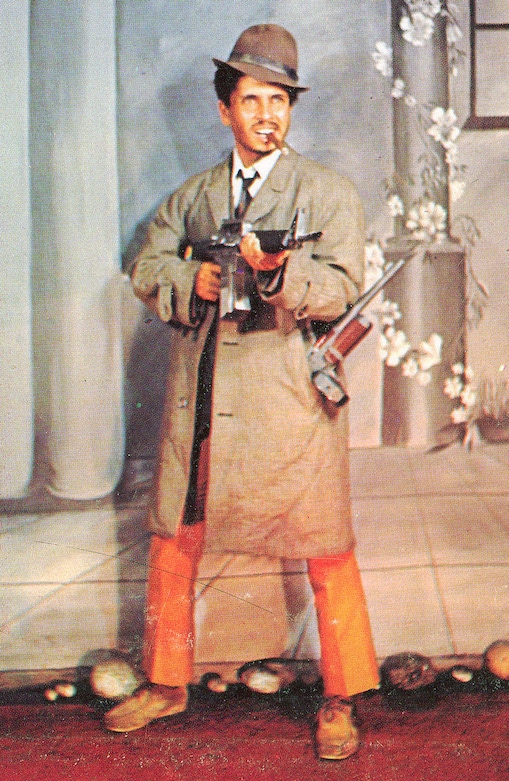Dennis Alcapone
The art of talk-over on record has been evident throughout the history of Afro-American and Afro-Caribbean sounds, but it was not until the sixties that deejays could lay claim to being recording artistes in their own right.
The first to make their mark were such pioneering toasters as Sir Lord Comic, Count Matchuki and King Stitt, who served their musical apprenticeships jocking at hugely popular sound system dances that provided the focus for the island’s thriving music scene. But it was not until U Roy began toasting over specially mixed dub-plates of a selected few Duke Reid rock steady rhythms for King Tubby’s Hometown Hi Fi in 1969 that the style first really caught the imagination of the Jamaican public.
The enormous success of these sides sparked frenzy among producers, eager to jump on the deejay bandwagon. Of those who burst forth upon the island’s music scene at this time, none proved more popular than Dennis Alcapone.
Aside from his choice of superb original songs over which to record, Dennis’ popularity was primarily due to a unique style, which belied a deceptively relaxed way with lyrics. His unique style had been developed during his time with the El Paso sound system, which operated from 1969 to the early months of 1970.
With Dennis as the main attraction, and both Lizzy and Samuel The First as alternate deejays, the El Paso set quickly became one of the island’s most popular systems, drawing huge crowds and causing roadblocks wherever it played. Following the launch of his recording career, Dennis repeated his success in the national charts and selling records in countries as far afield as Britain and Canada.
In an interview with Ray Hurford and Geoff Sullivan of the reggae fanzine, ‘Small Axe’, Dennis recalled his early days:
‘At the time, I was playing El Paso, we had dubs playing. We would go into the studio and get the raw rhythm and play it. But we had to be careful, because with a few juice to the head, a few spliff to he head and the rhythm so nice’
Can you imagine this record, ‘Moonlight Lover’, you kept hearing it. The on night, you hear the introduction and you’re supposed to hear the vocal next, and you hear’the BASS! It was excitement, pure excitement!!! The people went wild, then they hear the deejay start toasting to it and it make them even wilder. That is how this thing catch on so much.
‘Wake The Town’ [by U Roy], that record sold like hot bread. Worse when he did ‘Rule The Nation’ ‘ people line up outside Duke Reid’s studio, waiting for the record to come off the press. People who owned record shops in those days licked their fingers. On a weekend, they know they could sell 10,000 U Roy [records]. And how U Roy put over his lyrics was completely different from King Stitt [who] was more or less a shouter’he was riding, but U Roy gave the rhythm more jive. And I come with a sing talk’so the people could sing along.’
Dennis’ ‘singing style’ was pioneered on his early records, notably those for Keith Hudson Clement ‘Coxson’ Dodd and Winston ‘Niney’ Holness, all of whom produced the singer in 1970.
Over the next couple of years, his output remained prolific, recording for a succession of Kingston-based producers, whose number included Byron Smith, Phil Pratt, Bunny Lee, Alvin Ranglin, Prince Buster, Sonia Pottinger, Lee Perry, Prince Tony, Winston Riley, Joe Gibbs, Clive Chin and Duke Reid. The latter, who had issued U Roy’s earliest hits, repeated his success with Dennis, with sides such as ‘Number One Station’, ‘Rock To The Beat’, ‘The Great Woggie’, ‘Wake Up Jamaica’, ‘Teach the Children’ and ‘Musical Alphabet’ all becoming significant local hits. The producer also gathered a number of these, along with tracks by Lizzy for the best-selling LP, ‘Soul To Soul ‘ DJ’s Choice’, while Coxson Dodd and Bunny Lee issued the ‘Forever Version’ and ‘Guns Don’t Argue’ collections.
Around 1972, Dennis also began producing material, releasing ‘Get In The Groove’, featuring himself alongside Dennis Brown, ‘Ape Man’ by Augustus Pablo and Delroy Wilson‘s ‘Little Village’. Meanwhile, his enormous popularity was reflected in Swing magazine‘s music awards for 1971/2, at which he was presented with a cup for being the island’s most popular deejay.
In 1973, Dennis embarked on a successful six-week tour of the UK and shortly after returning to Jamaica, decided to make Britain his permanent home. Although his output dropped off considerably following his relocation to London, he still occasionally provided glimpses of his undeniable talent, with recordings for a number of UK based producers, most notably Sydney Crooks and Count Shelley.
Tragically, Dennis’ career came to an abrupt halt in 1979 following the death of his mother, who had been his major source of inspiration throughout his career. And while he has since resumed his deejaying career, regularly reminding audiences that he has lost of the talent that first made him a star in the early 1970s.

